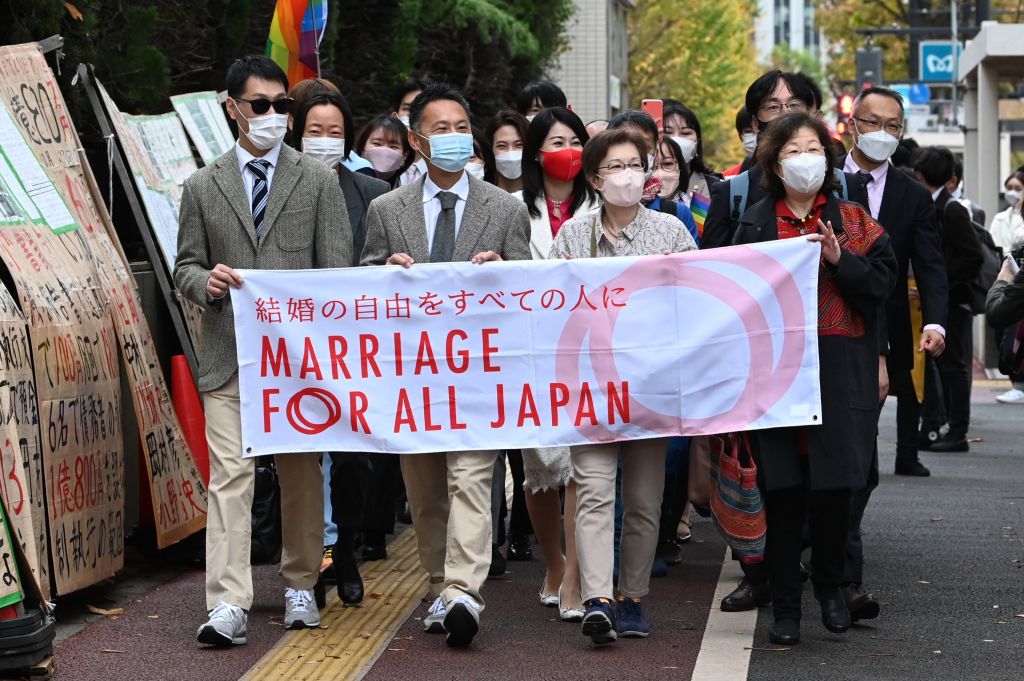
The Tokyo District Court ruled on Wednesday that Japan’s ban on same-sex marriage is in line with the constitution. At the same time, it noted that the lack of any legal system for same-sex couples to have families was an infringement of their rights. Advocates say the decision, in Japan’s capital and its most populous city, while not ideal, holds promise for the LGBTQ rights movement.
“Although frustrating, this is good news,” Yuri Igarashi, the president of the non-profit Rainbow Soup, which supports awareness of LGBTQ issues in Japan, tells TIME. “I see this ruling as a step forward toward the legalization of same-sex marriage.”
Wednesday’s case involved eight people who alleged Japan’s same-sex marriage ban contravenes the country’s constitution and were seeking damages of about $7,000 each. The court rejected the plaintiffs’ claims. But it also said that the absence of a legal system for same-sex couples to become family members is “in a state of unconstitutionality” and presents a “grave threat and obstacle” to people’s humanity, according to Kyodo News.
According to a report by Nikkei, the judge cited conflicting parts of Article 24 of the country’s constitution: it’s first clause holds that marriage should be between a man and woman, while its second holds that “matters pertaining to marriage and the family” should be enacted based on “individual dignity and the essential equality of the sexes.”
The LGBTQ rights movement in Japan—the only member of the Group of Seven (G7) industrialized nations that doesn’t recognize same sex unions—has had mixed success recently.
The Tokyo decision is the third in a series of rulings the last two years, with more expected over the coming months. More than a dozen same-sex couples filed lawsuits at district courts on Valentine’s Day in 2019 in a push to advance marriage equality in Japan.
Both previous decisions also rejected claims for compensation, but they arrived at different conclusions about the constitutionality of the ban. In June, a ruling from a court in Osaka said that freedom of marriage in the constitution referred only to male-female unions, and that the country’s ban on same-sex marriage was therefore constitutional. That followed a ruling the other way in March last year by the Sapporo District Court, which said Japan’s definition of marriage, which excludes same-sex couples, violated constitutional guarantees of equality.
More from TIME
Earlier this month, the Tokyo metropolitan government began issuing partnership certificates to same-sex couples, which allow same-sex couples that live, work or study in the Tokyo area to benefit from some rights and welfare programs that opposite-sex couples are eligible for, like being able to visit their partner in the hospital and living in public housing together. Although Tokyo’s rollout of a partnership system means that local governments in areas where about 60% of the country’s population live have partnership rights, these systems don’t allow those couples the same rights as married heterosexual couples. The partnership certificates are not legally binding, and don’t give same-sex couples the right to things like joint custody of children or spousal tax deductions.
Although support has grown for LGBTQ rights in recent years, especially among younger Japanese people, many of the country’s ruling Liberal Democratic Party lawmakers are deeply conservative and have balked at recent pushes to advance LGBTQ equality. In 2021, the government failed to enact a law banning discrimination against LGBTQ people despite a push from activists ahead of the Tokyo Olympics, in which a record number of LGBTQ athletes competed.
Alexander Dmitrenko, the co-chair and co-founder of Lawyers for LGBT & Allies Network says that while he is disappointed in the Tokyo court’s “timidity to rule more unequivocally in favor of equality,” he remains hopeful about the potential for future progress. “The critical part of it is that the court has agreed that lesbian and gay couples deserve equality in Japan,” he says.
More Must-Reads from TIME
- Where Trump 2.0 Will Differ From 1.0
- How Elon Musk Became a Kingmaker
- The Power—And Limits—of Peer Support
- The 100 Must-Read Books of 2024
- Column: If Optimism Feels Ridiculous Now, Try Hope
- The Future of Climate Action Is Trade Policy
- FX’s Say Nothing Is the Must-Watch Political Thriller of 2024
- Merle Bombardieri Is Helping People Make the Baby Decision
Write to Amy Gunia at [email protected]